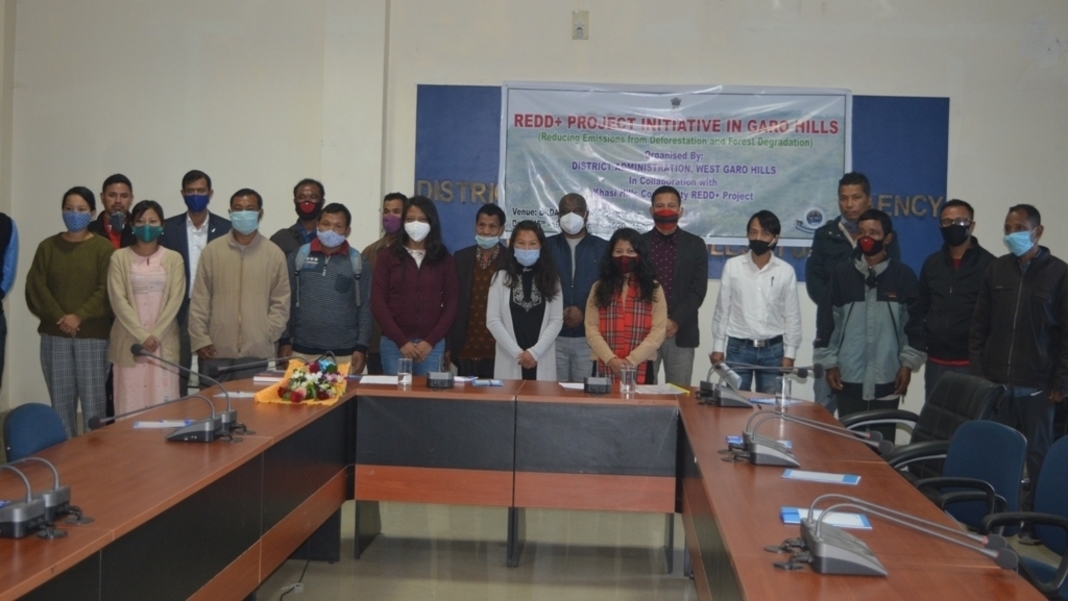Tura, Dec 15: The REDD+ Project Initiative was introduced in West Garo Hills district at DRDA Conference Hall today organized by the District Administration, West Garo Hills in collaboration with Khasi Hills Community REDD+ Project.
Speaking on the occasion, the West Garo Hills Deputy Commissioner, Ram Singh informed that the project aims to collaborate with Khasi Hills Community REDD+ Project and the counterpart in the Garo Hills region with a view to increasing forest cover, improve forest management, and also to provide sustainable economy through community participation and leadership. Pointing out to the large scale depletion of forest cover and aggressive plantation of Arecanut in the region, the Deputy Commissioner said that preserving the forest area is necessary in order to protect the water sources and catchment areas as well as to mitigate the carbon emitted by vehicles, greenhouse gases, factories, etc thereby increasing the level of oxygen which will further lead to the increase of natural and wildlife habitat in the region.
Stating that water is the most essential commodity in every household and needs water in our everyday activities, he said that students should be sensitized on this in schools and colleges so that they understand and learn to protect and preserve the water sources and the environment for the future generations as well. Further, he also urged the educated youth to carry out sustainable livelihood activities in their own villages instead of migrating to towns and cities for an insufficient and inadequate lifestyle while farming and other allied activities also offer lucrative and profitable business opportunities to earn a living. He also mentioned that the stakeholders along with Nokmas and dedicated community leaders will be identified and form cluster groups in order to register and implement the project in the region.
Meanwhile, Tambor Lyngdoh, Secretary of the “Ka Synjuk Ki Hima Arliang Wah Umiam-Mawphlang Welfare Society (KSKHAWU-MWS) which is a non-government, non-profit and charitable organization with its headquarters at Mawphlang informed that the REDD+ Project Initiative does not only involves in Reducing Excessive Emissions from Deforestation and Forest Degradation but also provides Sustainable Management of Forest (SMF) and Afforestation and Reforestation (A&R) activities. In addition to these, the project has created a strategic partnership with private sectors for investing in carbon offset credits that will help co-finance climate change adaptation activities over the long term, he informed.
Further, he informed that in Khasi Hills the project has been approved by the Khasi Hills Autonomous District Council with the support of the Chief Secretary of the State of Meghalaya including Forest Department and the Head of Climate Change Division of the Ministry of Government of India and is the First Community Forestry Federation in North East India comprised of indigenous government and communities that own much of the region’s upland forest.
Moreover, he also mentioned that the project has been registered and certified through Plan Vivo, UK in 2013 as the Khasi Hills REDD+ Project, Meghalaya, India and is the First Community based REDD project in the North Eastern States of India. Besides, he said that these indigenous institutions are pursuing payments for ecosystem services (PES) including forest carbon sales of its carbon credits through the United Nations climate change strategy and Reducing Emissions from Deforestation and Forest Degradation (REDD).
The Nokmas of Baladingre, Clason T Sangma, Chibragre, Predish Ch Sangma, Romba Adinggre, Abal M Sangma and Selbalgre, Pilatson Sangma were also felicitated during the program with the “Certificate of Appreciation” for protecting and preserving the forest area in their A’king land.
Project Director, DRDA, Tura C N Sangma, Officials of line departments, Members of REDD+ Project initiative, Shillong were among others present on the occasion.



